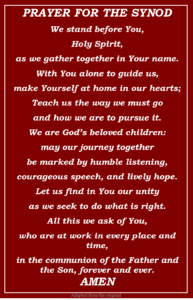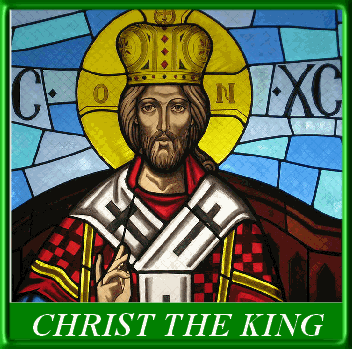20 November 2022
2 Samuel 5:1-3 Colossians 1:12-20 Luke 23:35-43
Theme: The Kingship of Jesus
The solemnity of Christ the King marks the end of Ordinary Time and the culmination of the Church’s liturgical year. This feast was instituted by Pope Pius XI in 1925 to promote devotion to the Universal Lordship of Christ in response to the growing secularism of the Western world. In 1969, Pope Paul VI gave the celebration a new title ‘Jesus Christ, King of the Universe’, and moved it from the last Sunday in October to the last Sunday in the liturgical year. He also declared it a ‘Solemnity.’ But what does it mean to worship Jesus as King of the Universe? And what kind of kingship are we celebrating?

Our common idea of Kingship evokes images of wealth, power, control, and distance from the concerns and struggles of ‘ordinary’ people – images impossible to associate with the figure of Jesus as presented in the gospels. Here we meet Jesus, the itinerant preacher who walked the roads of Galilee and had nowhere to lay his head, the good shepherd who went in search of the lost sheep, the compassionate healer whose touch brought inner peace as well as physical health, the man for others who came to serve, not to be served, the suffering Messiah who died forgiving his enemies. Our idea of kingship seems to contradict everything that Jesus stood for. And yet we honour Jesus as King. Why?
Nothing is more certain about the ministry of Jesus of Nazareth than that he proclaimed the kingdom or reign of God. The phrase ‘Kingdom of God’ occurs 122 times in the Gospels, 90 of which are on the lips of Jesus. The synoptic gospels introduce Jesus’ public ministry with the phrase: ‘The time is fulfilled. The kingdom of God is at hand. Repent. Believe the Good News’ (Mk 1:15). The kingdom God was the central theme of Jesus’ teaching and the event that shaped all his entire ministry – his table-fellowship with sinners and outcasts, his healing miracles and exorcisms, his forgiveness of sins. God’s kingdom, as lived and proclaimed by Jesus, meant good news for the poor, healing for the sick, and liberation for the enslaved and oppressed: ‘The Spirit of the Lord is upon me, for he has anointed me to bring good news to the afflicted. He has sent me to proclaim liberty to captives, sight to the blind, to let the oppressed go free, to proclaim a year of favour from the Lord’ (Lk 4:18-19).
The kingship of Jesus is, above all, a kingship of love and forgiveness, as our Gospel reading from Luke shows. Dying in the unspeakable agony of the Cross, and mocked by the leaders of the people, Jesus reaches out to those around him with words of forgiveness and consolation. The unique kingship of Jesus is recognised by the repentant thief: ‘Remember me when you come into your kingdom’ (Lk 23:42). And to him Jesus makes this promise: ‘Today you will be with mé in paradise’ (Lk 23:43). The same promise is made to us. As St Paul reminds us in our second reading today: ‘He (God the Father) has taken us out of the power of darkness and created a place for us in the Kingdom of his Son that he loves, and in him, we gain our freedom, the forgiveness of our sins’ (Col 1:13).
As inheritors of Jesus’ promise and sharers in his kingship, we are challenged to walk in his footsteps and imitate his example of love and forgiveness. But forgiveness does not come easy to us. Even in small things we find it difficult to forgive. We can bear grudges for years against those whom we consider to have wronged us, let us down, or treated us unfairly. This can include even to family members, neighbours, friends and colleagues at work or in school. We may harbour bad feelings towards them and even try to exact revenge. We avoid people with whom we have ‘fallen out’ or squabbled. We forget, or overlook the fact, that God has forgiven us.
Today’s gospel reminds us that is in forgiving that we are most like God our Father and Christ his Son. It is in forgiving that we bring healing to others and to ourselves, that we restore broken relationships and release the seeds of love in our communities and in the world. It is in forgiving that we manifest the kingship of Christ and extend on earth the reign of God’s love. I will end with a challenging reflection from the pen of Fr Flor McCarthy SDB (Salesian) which captures perfectly what the kingship of Christ means and the kind of response it requires from us. It is entitled ‘The victory of Love’.
On the Cross Jesus endured insults and mockery.
Yet his heart remained open, even to his enemies.
He absorbed all the violence, transformed it,
and returned it as love and forgiveness.
One’s pain can so easily turn into rage,
so that one wants only to lash out blindly
at whoever happens to be within range.
From the depth of his own pain,
Jesus reached out to comfort the thief.
Some people are like sugar cane:
even when crushed in the mill, what they yield is sweetness.
Jesus stretches our capacity for compassion.
He challenges our idea of love.
The pity is that it often goes unused.
By our love people will know that we
are followers of Christ the King.
Fr Michael McCabe SMA, Cork, November 2022
To listen to an alternative Homily from Fr Tom Casey of the SMA Media Centre, Ndola, Zambia please click on the play button below.
|
|

